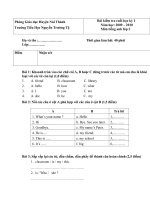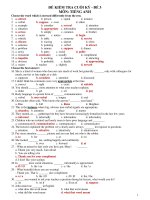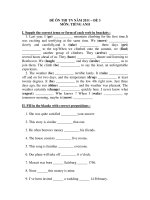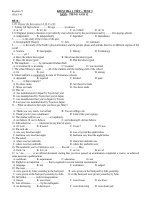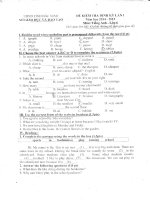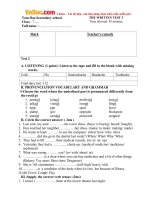ĐỀ KIỂM TRA CUỐI KỲ - ĐỀ 3 MÔN: TIẾNG ANH pps
Bạn đang xem bản rút gọn của tài liệu. Xem và tải ngay bản đầy đủ của tài liệu tại đây (73.85 KB, 4 trang )
1
ĐỀ KIỂM TRA CUỐI KỲ - ĐỀ 3
MÔN: TIẾNG ANH
Choose the word which is stressed differently from the rest.
1. a. attract b. person c. signal d. instance
2. a. verbal b. suppose c. even d. either
3. a. example b. consider c. several d. attention
4. a. situation b. appropriate c. informality d. entertainment
5. a. across b. simply c. common d. brother
6. a. social b. meter c. notice d. begin
7. a. whistle b. table c. someone d. receive
8. a. discuss b. waving c. airport d. often
9. a. sentence b. pointing c. verbal d. attract
10. a. problem b. minute c. suppose d. dinner
11. a. noisy b. party c. social d. polite
12. a. restaurant b. assistance c. usually d. compliment
13. a. impolite b. exciting c. attention d. attracting
14. a. obvious b. probably c. finally d. approaching
15. a. waiter b. teacher c. slightly d. toward
Choose the best answer:
16. She is a kind of woman who does not care much of work but generally _______ only with colleagues for
meals, movies or late nights at a club.
a. supposes b. socializes c. attention d. discussed
17. I didn't think his comments were very appropriate at the time.
a. correct b. right c. exact d. suitable
18. You should _______ more attention to what your teacher explains.
a. make b. get c. set d. pay
19. Body language is a potent form of _______ communication.
a. verbal b. non-verbal c. tongue d. oral
20. Our teacher often said, "Who knows the answer? _______ your hand."
a. Rise b. Lift c. Raise d. Heighten
21. This is the instance where big, obvious non-verbal signals are appropriate.
a. situation. b. attention c. place d. matter
22. They started, as ___ gatherings but they have become increasingly formalized in the last few years.
a. informal b. informally c. informalize d. informality
23. Children who are isolated and lonely seem to have poor language and ________.
a. communicate b. communication c. communicative d. communicator
24. The lecturer explained the problem very clearly and is always _______ in response to questions.
a. attention b. attentive c. attentively d. attentiveness
25. Pay more attention _______ picture and you can find out who is the robber.
a. to b. for c. at d. on
26. She looked _______ me, smiling happily and confidently.
a. on b. over c. forward d. at
27. - What an attractive hair style you have got, Mary! - _______
a. Thank you very much. I am afraid
b. You are telling a lie
c. Thank you for your compliment
d. I don't like your sayings
28. In _______ most social situations, _______ informality is appreciated.
a. Ø / Ø b. the / an c. a / the d. the / a
29. - What beautiful dress you are wearing!
- Thank you. That is _______ nice compliment.
a. a / a b. the / Ø c. Ø / Ø d. the / the
30. ______ you wanted to ask your teacher a question during his lecture, what would you do?
a. As b. As if c. Even of d. suppose
31. John asked me _______ in English.
a. what does this word mean b. what that word means
c. what did this word mean d. what that word meant
2
32. The mother told her son _______ so impolitely.
a. not behave b. not to behave c. not behaving d. did not behave
33. She said she _______ collect it for me after work.
a. would b. did c. must d. had
34. She said I _______ an angel.
a. am b. was c. were d. have been
35. I have ever told you he _______ unreliable.
a. is b. were c. had been d. would be
36. I told him _______ the word to Jane somehow that I _______ to reach her during the early hours.
a. passing / will try b. he will pass / tried
c. to pass / would be trying d. he passed / have tried
37. Laura said she had worked on the assignment since _______.
a. yesterday b. two days ago c. the day before d. the next day
38. John asked me _______ interested in any kind of sports.
a. if I were b. if were I c. if was I d. if I was
39. I _______ you everything I am doing, 'and you have to do the same.
a. will tell b. would tell c. told d. was telling
40. John asked me _______ that film the night before.
a. that I saw b. had I seen
c. if I had seen d. if had I seen
41. The boy waved his hands to his mother, who was standing at the school gate, to ___ her attention.
a. attract b. pull c. follow d. tempt
42. If something _______ your attention or your eye, you notice it or become interested in it.
a. pays b. allow c. catches d. wave
43. When you are in a restaurant, you can raise your hand slightly to show that you need assistance.
a. bill b. menu c. help d. food
44. After a _______ hesitation, she began to speak with such a convincing voice.
a. rude b. slight c. small d. impolite
45. He is one of the most _______ bosses I have ever worked with. He behaves rudely to not only me but also
others in the staff.
a. thoughtful b. impolite c. attentive d. communicative
46. In many cultures, people signify their agreement by _______ their head.
a. turning b. raising c. pointing d. nodding
47. There was a _______ tremble in her voice, which showed that she was very nervous at that time.
a. slight b. slighted c. slightly d. slightness
48. If a boss wants to have a well-qualified staff, he should have to pay his employees _______.
a. appropriate b. appropriately c. appropriation d. appropriating
49. Mrs. Pike was so angry that she made a _______ gesture at the driver.
a. rude b. rudeness c. rudely d. rudest
50. _______ nonverbal language is _______ important aspect of interpersonal communication.
a. The / Ø b. A / the c. The / a d. Ø / an
51. Balzer, _______ linguistic researcher, reported that approximately 75% of classroom management behavior
was nonverbal.
a. a b. an c. the d. Ø
52. I have never seen such a beautiful dress _______ you before.
a. of b. on c. for d. in
53. Small children are often told that it is rude to point _______ other people.
a. on b. to c. at d. for
54. - You look great in this new dress. - ________.
a. With pleasure
b. Not at all
c. I am glad you like it
d. Do not say anything about it
55. Suppose you want to go out during a lecture, what should you do?
a. As b. If c. Though d. When
56. Peter said that he had lived in London four years _______.
a. ago b. before c. later d. then
3
57. The guest told the host that _______.
a. I must go now b. he must go now c. he had to go now d. he had to go then
58. The teacher told Joe _______.
a. to stop talking b. stop talking c. stops talking d. stopped talking
59. She said she _______.
a. was very tired last night b. was very tired the night before
c. had been very tired last night d. had been very tired the night before
60. Emily said that her teacher _______ to London _______.
a. will go / tomorrow b. went / tomorrow
c. would go / the next day d. had gone / the next day
61. She told the boys _______ on the grass.
a. do not play b. did not play c. not playing d. not to play
62. She asked _______.
a. where was her umbrella b. where her umbrella was
c. where were her umbrella d. where her umbrella were
63. Jason asked me _______ me the book the day before.
a. if who gave b. if who has given
c. who had given d. that who had given
64. Robert said that his father _______ to Dallas the year before.
a. goes b. went c. has gone d. had gone
65. He wanted to know _______ shopping during the previous morning.
a. if we had been going b. that if we had been going
c. we were going d. that we were going
66. "How beautiful is the dress you have just bought!" Peter said to Mary.
a. Peter promised to buy Mary a beautiful dress.
b. Peter said thanks to Mary for her beautiful dress.
c. Peter complimented Mary on her beautiful dress.
d. Peter asked Mary how she had just bought her beautiful dress.
67. She raised her hand high so that she could attract her teacher's attention.
a. Because her teacher attracted her, she raised her hand high.
b. To attract her teacher's attention, she raised her hand high.
c. Though she raised her hand high, she could not attract her teacher's attention.
d. She had such a high raising of hand that she failed to attract her teacher's attention.
68. "Hello, Mary!" Peter said. '
a. Peter said hello Mary. b. Peter said Mary hello.
c. Peter told Mary hello d. Peter greeted Mary.
69. Julie and Anne had not met each other before he party.
a. Julie and Anne got acquainted when they were at the party.
b. The party prevented Julie and Anne from meeting each other.
c. The party was the place where Julie and Anne could not meet each other.
d. Julie and Anne used to meet each other for the party.
70. "Why don't you ask the teacher for help?" Peter asked me.
a. Peter advised me to ask the teacher for help.
b. Peter recommended me not to ask the teacher for help. ,
c. Peter told me the reason why I did not ask the teacher for help.
d. Peter suggested that he should ask the teacher for help.
71. When you see your teacher approaching you, a slight wave to attract his attention is appropriate.
a. coming nearer to b. catching sight of c. pointing at d. looking up to
72. When you catch someone's ___ you do something to attract his attention so that you can talk to him.
a. head b. hand c. eye d. ear
73. When the play finished the audience stood up and _______ their hands loudly.
a. clapped b. nodded c. shook d. hold
74. It is _______ not to say "Thank you" when you are given something.
a. small b. rude c. slight d. formal
75. A whistle is the _______ for the football players to begin the match.
a. communication b. instance c. attention d. signal
4
76. It is often considered to be impolite to _______ at someone.
a. look b. smile c. point d. raise
77. He is not really friendly and makes no attempt to be _______.
a. society b. social c. socialize d. sociable
78. She sent me a _______ letter thanking me for my invitation.
a. polite b. politely c. politeness d. impoliteness
79. Mr. Timpson's behavior and comments on occasions were inappropriate and fell below the ___standards.
a. accept b. acceptable c. acceptance d. accepting
80. In general, the meaning of _______ touching depends of the situation, culture, sex, and age.
a. a b. am c. the d. Ø
81. ___ same words or phrases can have many __ different meanings, depending on how they are said.
a. Ø / Ø b. A / the c. Ø / the d. the / a
82. I recognized my grandmother as soon as she got _______ the plane although we had not seen each other for
more than 10 years.
a. over b. of c. away d. off
83. I waved _______ him from the window but he didn't see me.
a. through b. for c. up d. to
84. - How well you are playing! - ________.
a. Say it again. I like to hear your words
b. I think so. I am proud of myself
c. Thank you too much
d. Many thanks. That is a nice compliment
85. He asked me _______ Robert and I said I did not know _______.
a. that did I know / who were Robert
b. that I knew / who Robert were
c. if I knew / who Robert was
d. whether I knew / who was Robert
86. The mother asked her son _______.
a. where he has been b. where he had been
c. where has he been d. where had he been
87. Martin asked me _______.
a. how is my father b. how my father is
c. how was my father d. how my father was
88. The host asked Peter _______ tea or coffee.
a. whether he preferred b. that he preferred
c. did he prefer d. if he prefers
89. She asked me _______ my holidays _______.
a. where I spent / the previous year b. where I had spent / the previous year
c. where I spent / last year d. where did I spend / last year
90. He advised _______ too far.
a. her did not go b. her do not go c. her not to go d. she did not go
91. John often says he _______ boxing because it _______ a cruel sport.
a. does not like / is b. did not like / were
c. not liked / had been d. had not liked / was
92. Nancy asked me why I had not gone to New York the summer _______.
a. before b. ago c. last d. previous
93. He asked _______ him some money.
a. her to lend b. she to lend c. she has lent d. she lends
94. Andrew told me that they _______ fish two _______ days.
a. have not eaten / ago b. had not eaten / previous
c. did not eat / before d. would not eat / last
95. Jason told me that he _______ his best in the exam the _______ day.
a. had done / following b. will do / previous
c. would do / following d. was going / previous

